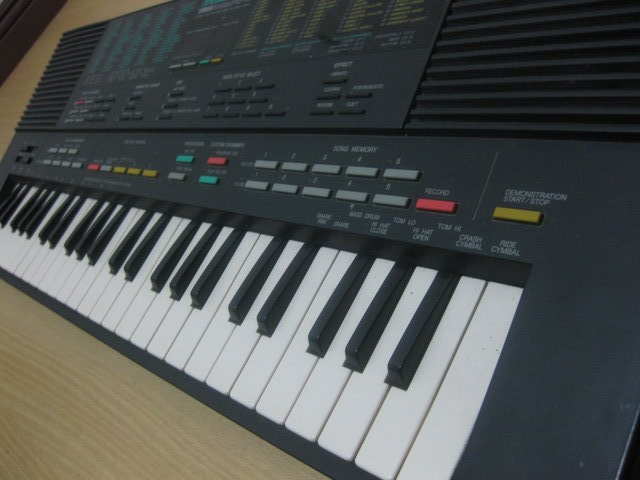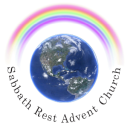This section contains mostly some experiments with a Yamaha PSS-480 synthesizer and early American “fuging tunes“. There are a few other recordings mixed in among the lot, some with real instruments and singing, but the bulk of the songs use the Yamaha PSS.
These recordings were made a few years after I discovered an original copy of the Hesperian Harp (1848) in a used bookstore in Vancouver, BC, Canada (appx. 1987). It was one of my first contacts with this unusual form of sacred music, and it deeply impressed me.
There were two distinct styles in this book (as in similar books from that time period): a folk-hymn style, based on Irish/Scottish/English folk music; and a native American innovation: the fuging tune (although this style was at least partly inspired by the Gallery Music tradition from England). Both of these styles were more exciting, original, much less sentimental, and more ruggedly beautiful than the standard revival hymns of the later 1800’s by the likes of Moody, Sankey, and Fanny Crosby.
Some years after discovering this branch of sacred music, I produced a songbook collection based on the folk-hymn style: Song in the Night. This is offered in PDF format on this website.
The other style: the “fuging tune” is represented by a series of instrumental recordings performed on the Yamaha PSS-480, a lovely little FM Synthesized keyboard.
Since I did not belong to a choir, nor did my friends know sight-reading well enough to perform the fuging tunes, recording them into the keyboard’s memory helped me to hear what they sounded like. I also had fun experimenting with the sound-shaping capability of the keyboard…each pre-programmed instrumental voice was comprised of two frequency oscillators, which could be individually tweaked to produce something far more interesting than the out-of-the-box sounds.
The recordings were made in 1990, before the advent of the Internet and personal computers. At that time, they were recorded from the keyboard onto cassette tape. But for their current form on this website, they have been re-mastered in Cakewalk Sonar, with some equalization, Sonic Maximizer processing, and a bit of stereo enhancement added to brighten them up.
This is not easy-listening music, nor is it a polished recording. The tracks were recorded one-by-one into the keyboard’s memory, and sometimes a live part was added during the final recording onto cassette. Parts were switched in and out, tempo and tuning were adjusted on the fly, for variety. The keyboard was not touch-sensitive, so there are very little dynamics. I am not a trained keyboard player, so there are mistakes.
This is an experimental work! If you enjoy synthesized performances of classical music, and have an open mind and ear for new and different sounds and combinations of tones, you will enjoy these recordings. They do, however, (I hope) convey some of the excitement and energy that is in this unique early American musical format.
(Note: three of the songs offered in this section are from Lutheran sources, not from the early American tradition: These are the Holy Ten Commands; Be Not Dismayed, Thou Little Flock; and All Glory Be To God On High.)
- Alabama
- All Glory Be To God On High
- America
- Angel’s Song
- Babylonian Captivity
- Bladensburg
- Be Not Dismayed, Thou Little Flock
- Berne
- Christian Travellers
- Clamanda
- Dance of Victory
- Delight
- Edom
- Evening Shade
- Exultation
- Fiducia
- Florida
- Garden
- Golden Hill
- Grafton
- Heavenly March
- Jehalah
- Judgment
- Kind Farewell
- Lamberton
- Lena
- Meditation
- Minister’s Farewell
- Mixture
- Mortality
- Mount Cumberland
- New Concord
- New Hope
- Norwich
- Pilgrim’s Prayer
- Providence
- Rainbow
- Rockbridge
- Sharon
- The Family Bible
- These are the Holy Ten Commands
- Vermont
- Voice of Nature
- Way to Zion
- Wesley
Tags: Early American, Hesperian Harp



Do you offer CD’s or downloads of early american, shape note, etc.? how do I go about finding them on your site? I would like the option of obtaining some of these recordings. Thanks. – Peter Oliva
I am interested in obtaining some of these recordings, can you give me information? thank you.
There are four sets of recordings drawn from the early American tradition on the website. These are comprised of a number of songs, and each song can be downloaded individually as an MP3. I don’t have a mass-download set up, but you could use an add-on to your browser called “Down them All” (or perhaps there are others) which can search for all of a certain file type on a website. Or you could use HTTrack, a program that can mirror (download) a whole website. You could pass it just the branches you want (so you don’t end up getting the whole site, which is quite large). That failing, if you let me know what you would like, I can put together the songs into a file and make it available.
The Four sets of recordings are these:
Scenes Along Zion’s Road – A collection of songs mostly from the Hesperian Harp. The majority are performed on a small synthesizer, but there are a few songs in here with live instruments and/or voice (Be Not Dismayed Thou Little Flock, Christian Travellers (second half), Dance of Victory, Grafton, Jehalah, The Family Bible, Wesley). The songs that are from the Hesperian Harp are noted by page number. While I didn’t link these, you can easily find them at the website (linked above, and linked on my website) which has all the scanned images of the Hesperian Harp.
Joyful Sound – These are also drawn from the Hesperian Harp. They are recordings with real instruments and/or voice. Some have nature sounds mixed in. I linked the score for each of these (as well as the MP3).
Song in the Night – This section contains two sets of recordings, both of them based on the music book I prepared, Song in the Night. Many of the songs were drawn from the Hesperian Harp, but other sources were also used, including other songbooks of the same time period, and some songs were made up from folk music, plus sacred poetry, which I put together. You can download this book in PDF format. I also have a few printed copies available if you’d rather order one. $20, plus shipping (I have a US Post Office box, so can send media mail).
A. Sabbath Meeting – Most of these recordings came from some live singings with some friends. Some are solo performances with multi-tracking. Some of the live recordings also have parts dubbed in later.
B. North American Recordings – These songs, also drawn from Song in the Night, were recorded with some friends from New York in one evening, before they left to go back home. We rented some microphones and a DAT recorder and just recorded what we sang, without any editing.
If there’s anything else I can do, or if there are further questions, let me know. If you are looking for CD recordings of early American Shape Note music by professional singing groups, two CD’s come to mind: “Rivers of Delight,” by the Word of Mouth Chorus, and “Make a Joyful Noise: Mainstreams and Backwaters of American Psalmody 1770-1840” by The Oregon State University Choir. These are among the first I heard and that really opened my mind to this type of music.